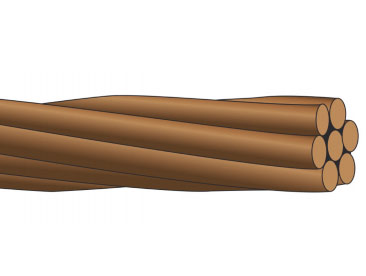
Grounding wire is a critical component in electrical systems. This wire serves a pivotal role by providing a direct pathway for electrical energy to travel into the earth in the event of a short circuit. By creating a reliable outlet for this energy, grounding wires contribute significantly to the stabilization of voltage levels. Their role is crucial in protecting people from electric shock and in safeguarding electrical devices from potential damage due to power surges or lightning strikes.
Exploring the Use of PV Wire as Grounding Wire
Photovoltaic Wire, or PV Wire, stands as an excellent choice for grounding wire. The name of this wire type suggests its specific design for solar power applications, but it can serve numerous purposes in various contexts. PV Wire comes in both aluminum and copper variants, each carrying its distinct set of benefits.
Aluminum PV Wire, for instance, boasts a lightweight nature coupled with a resistance to corrosion. Its cost-effectiveness makes it an appealing choice in various applications. Copper PV Wire, on the other hand, exhibits high conductivity and durability, ensuring effective grounding over extended periods of time.
The Strengths of Bare Copper Wire
Bare copper wire stands as a popular grounding wire choice due to its high conductivity. The efficient flow of energy it enables ensures that electrical currents are effectively diverted to the ground. Both stranded and solid versions of bare copper wire have widespread use in building grounding systems.
Stranded copper wire, composed of several small strands of wire bundled together, offers a larger surface area than a solid copper wire of the same diameter. This structure allows for greater flexibility and resistance to metal fatigue, making it an excellent choice in applications where the wire will undergo constant movement or vibration.
In contrast, solid copper wire consists of a single, solid strand, making it more rigid than its stranded counterpart. Its rigidity makes it well-suited for permanent installations where minimal movement is expected. Examples include residential and commercial building grounding systems.
Concluding Thoughts on Grounding Wire
In conclusion, grounding wire holds an indispensable position in any electrical system. By selecting the right type, whether it’s PV Wire in aluminum or copper, bare copper wire, stranded or solid, you can effectively fortify your grounding system. This safeguard not only protects people and equipment from electrical faults, but it also enhances the overall efficiency and stability of the electrical systems.
It’s worth remembering that the choice of grounding wire hinges upon the specifics of the application and environmental conditions. Always consider these critical factors when making your selection to ensure optimal protection and performance of your electrical systems. An informed choice in this domain goes a long way in maintaining the safe and efficient operation of your electrical infrastructure.

